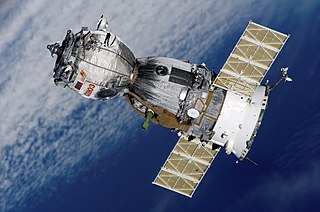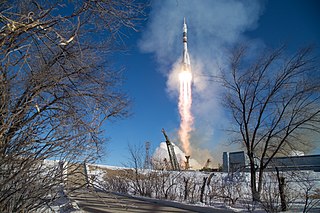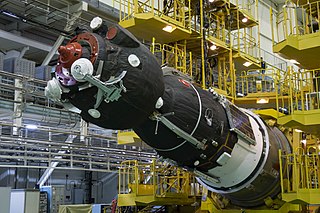
The Soyuz programme is a human spaceflight programme initiated by the Soviet Union in the early 1960s. The Soyuz spacecraft was originally part of a Moon landing project intended to put a Soviet cosmonaut on the Moon. It was the third Soviet human spaceflight programme after the Vostok and Voskhod programme.

Soyuz is a series of spacecraft designed for the Soviet space program by the Korolev Design Bureau in the 1960s that remains in service today, having made more than 140 flights. The Soyuz succeeded the Voskhod spacecraft and was originally built as part of the Soviet crewed lunar programs. The Soyuz spacecraft is launched on a Soyuz rocket, the most reliable launch vehicle in the world to date. The Soyuz rocket design is based on the Vostok launcher, which in turn was based on the 8K74 or R-7A Semyorka, a Soviet intercontinental ballistic missile. All Soyuz spacecraft are launched from the Baikonur Cosmodrome in Kazakhstan. Soyuz has served as the only means for Americans to make crewed space flights in the world since the retirement of the US Space Shuttle in 2011 and is heavily used in the International Space Station program.

The Soyuz-U launch vehicle was an improved version of the original Soyuz rocket. Soyuz-U was part of the R-7 family of rockets based on the R-7 Semyorka missile. Members of this rocket family were designed by the TsSKB design bureau and constructed at the Progress Factory in Samara, Russia. The first Soyuz-U flight took place on 18 May 1973, carrying as its payload Kosmos 559, a Zenit military surveillance satellite. The final flight of a Soyuz-U rocket took place on February 22, 2017, carrying Progress MS-05 to the International Space Station.

The Soyuz-FG launch vehicle was an improved version of the Soyuz-U from the R-7 family of rockets, designed and constructed by TsSKB-Progress in Samara, Russia. Guidance, navigation, and control system was developed and manufactured by "Polisvit" Special Design Bureau.

Soyuz MS-01 was a 2016 Soyuz spaceflight to the International Space Station. Originally scheduled for launch in June 2016, the mission successfully lifted off from Kazakhstan on July 7, 2016. It transported three members of the Expedition 48 crew to the International Space Station. MS-01 is the 130th flight of a Soyuz spacecraft, and the first with the new version Soyuz MS. The crew consisted of a Russian commander, a Japanese flight engineer, and an American flight engineer.

The Soyuz-MS is the latest revision of the Soyuz spacecraft. It is an evolution of the Soyuz TMA-M spacecraft, with modernization mostly concentrated on the communications and navigation subsystems.

Soyuz MS-02 was a 2016 Soyuz spaceflight that was planned for a 23 September 2016 launch, but because of technical difficulties it launched on 19 October 2016. It transported three members of the Expedition 49 crew to orbit and docked with the International Space Station. MS-02 was the 131st flight of a Soyuz spacecraft. The crew consists of a Russian commander and flight engineer, as well as an American flight engineer. MS-02 docked with (Poisk module on Friday, October 21, 2016.

Soyuz MS-05 was a Soyuz spaceflight which launched on 28 July 2017. It transported three members of the Expedition 52 crew to the International Space Station. MS-05 was the 134th flight of a Soyuz spacecraft. The crew consists of a Russian commander, and a European and an American flight engineer. It returned to Earth on 14 December 2017 after 139 days on orbit.

Progress MS-01, identified by NASA as Progress 62 or 62P is a Progress spacecraft used by Roskosmos to resupply the International Space Station (ISS) during 2015. It was launched on December 21, 2015, to deliver cargo to the ISS. Progress MS-1 is the first vehicle in the Progress-MS series.

Soyuz MS-07 is a Soyuz spaceflight launched on 17 December 2017 07:21 UTC. It transported three members of the Expedition 54 crew to the International Space Station. MS-07 was the 136th flight of a Soyuz spacecraft. The crew consists of a Russian commander, Japanese doctor, and an American flight engineer..

Soyuz MS-08 was a Soyuz spaceflight that launched on 21 March 2018. It transported three members of the Expedition 55 crew to the International Space Station. MS-08 was the 137th flight of a Soyuz spacecraft. The crew consisted of a Russian commander, and two American flight engineers.

Progress MS-10, identified by NASA as Progress 71 or 71P, is a Progress spacecraft used by Roscosmos to resupply the International Space Station (ISS).

Soyuz MS-10 was a crewed Soyuz MS spaceflight which aborted shortly after launch on 11 October 2018 due to a failure of the Soyuz-FG launch vehicle boosters. MS-10 was the 139th flight of a Soyuz spacecraft. It was intended to transport two members of the Expedition 57 crew to the International Space Station. A few minutes after liftoff, the craft went into contingency abort due to a booster failure and had to return to Earth. By the time the contingency abort was declared, the launch escape system (LES) tower had already been ejected and the capsule was pulled away from the rocket using the launch escape solid rocket motors on the capsule fairing. Both crew members, Roscosmos cosmonaut Aleksey Ovchinin and NASA astronaut Nick Hague, were recovered alive and in good health. The MS-10 flight abort was the first instance of a Russian crewed booster accident in 35 years, since Soyuz T-10-1 exploded on the launch pad in September 1983. On 1 November 2018, Russian scientists released a video recording of the mission.

Soyuz MS-11 was a Soyuz spaceflight that launched on 3 December 2018, marking the 100th orbital launch of the year. Originally scheduled for 20 December, the launch date was advanced to 3 December following the failure of Soyuz MS-10. MS-11 is the 140th flight of a Soyuz spacecraft and carried the three members of the Expedition 58 crew to the International Space Station. The crew consists of a Russian commander, and an American and a Canadian flight engineer.

Soyuz MS-13, also designated ISS flight 59S, is a Soyuz spaceflight launched on 20 July 2019 – the day of the first moon landing – carrying three members of the Expedition 60 crew to the International Space Station: a Russian commander, an American and a European flight engineer. MS-13 was the 142nd flight of a Soyuz spacecraft. It was at one point the last Soyuz flight contracted by NASA in the expectation that subsequent astronaut transport would be provided by the Commercial Crew Program, but in early 2019 NASA sought to purchase two additional Soyuz seats to provide greater certainty given delays in that program.

Soyuz MS-16 is a Soyuz spaceflight planned for April 2020. It will transport three members of the Expedition 62 crew to the International Space Station.

Expedition 59 was the 59th Expedition to the International Space Station. It started with the arrival of the Soyuz MS-12 spacecraft carrying Aleksey Ovchinin, Nick Hague and Christina Koch, joining Oleg Kononenko, David Saint-Jacques and Anne McClain who transferred from Expedition 58. The expedition formally began on March 15, 2019. Ovchinin and Hague were originally meant to fly to the ISS aboard Soyuz MS-10, but returned to Earth minutes after takeoff due to a contingency abort. The expedition formally ended with the undocking of the Soyuz MS-11 spacecraft carrying Kononenko, Saint-Jacques and McClain on 24 June 2019; Ovchinin, Hague and Koch transferred to Expedition 60.

Soyuz MS-14 was a Soyuz spaceflight to the International Space Station. It carried no crew members, as it was intended to test a modification of the launch abort system for integration with the Soyuz-2.1a launch vehicle. It launched successfully on 22 August 2019 at 03:38 UTC. It was the first mission of the Soyuz crew vehicle without a crew in 33 years, and the first ever unpiloted mission of Soyuz to ISS.
















